Jennifer at somewhere nearby Beijing around 1996. 曾錚1996年左右於北京郊區。

Jennifer at somewhere nearby Beijing around 1996. 曾錚1996年左右於北京郊區。

曾經,爲那份失去的情,那個失去的家和愛人,我痛得想用刀往自己的心窩上扎。我倒地大哭、臥牀不起。我如行屍走肉般,全然沒了生機……
有一天,五年後, 生日那天吧,我躺在牀上,呆望著天花板,突然作出一個決定:我不想要這樣活了,我今天要先笑一次,以後還要每天都笑,我從此要開心起來。
決心一下,我真的不那麼痛了。我也不知我到底笑了沒有,反正也沒人在看。
我爬下牀去,繼續工作,那個讓我痛的東西,終於淡去了。
現在,又是七年過去了吧?今天再次見到以前在一起生活時的照片,居然也能微微一笑,溫柔面對了。
佛陀早就說過,人生無常;法輪大法的師父也曾講,「情是個最不可靠的東西」,「理論」上懂,可事情真的輪到自己頭上時,實踐中要看穿、放下,並不容易。這不,這個「祕密」,我一守就是十二年,根本原因,還是我不願面對、不願提起。
好在,宇宙中有永恆的東西,也有很多的美好。走過來了,就都值得慶幸。
是爲記。
2019年3月17日
最近正在做一份關於中共奴工產品的調查報導。當我把某種產品的名稱放入法輪功明慧網的「搜索」商口時,立即得到八十四個結果。
通過這八十四篇來自中國大陸的報導,我不但可以了解中國至少有多少勞教所、監獄和看守所做過這種產品,還可以了解到每人每天的定量、勞教所、監獄和看守所等大致能得到多少加工費。
然後我把這加工費與這種產品在國際上的售價比較了一下,得到一個驚人的結果:產品的售價,是其勞工成本的一萬倍!!!
也就是說,能賣到一百元的某產品,勞教所、監獄和看守所(不是奴工)拿到的加工費只有一分錢!
如此說來,哪個國家能與中共國競爭?美國的工作機會怎麼會不流失?!
在中美貿易戰中,美國許多專家、政界人士都在大談特談中共國的政府補貼問題。
但是,如果大家能意識到除了政府補貼,更有數百萬甚至更多的沒有成本的奴工時,那麼這場「戰爭」的不對等性,就更加突顯出來了。
然後我突然意識到,明慧上發表和保存的資料,有多麼寶貴。
也許那些受迫害的學員,在寫出一篇篇受迫害的血淚控訴時,並沒有意識到他們提供的這些真實而「原始」的資料和數據有朝一日能夠幫助國際社會進行研究和調查,但他們本著「揭露迫害」、「講真相」的初衷,記錄下了一份份最寶貴的原始資料。
但這些資料積累到一定程度時,價值就突顯出來了。
在大陸法輪功學員冒著生命危險把這些資料收集、記錄、並傳播出來的同時,海外法輪功學員數十年如一日,每天收集、整理、編輯、並發表這些來自大陸的第一手珍貴資料,投入的時間和心血是難以估量的。
與此同時,他們還必須對抗手握全部國家資源的中共的攻擊和封殺,才能保證網站的正常運行,保證海內外讀者都能訪問網站。
而所有這些,都是在他們自身遭受嚴重迫害的情況下做出來的。我們可能永遠不會知道,爲了把這些寶貴的資料和數字收集並傳播出來,有多少人付出了多大的代價和犧牲。
我想,這就是這世界應該感謝法輪功學員的另一個原因吧。
至少在今天,作爲一名調查記者,我對這一切深深地感激。
While conducting an investigation on slave labor inside China, I put the name of a certain product inside the “search” window of Falun Gong’s official website, en.minghui.org, and immediately got 84 results. I could not only see on what a scale this product has been made inside Chinese labor camps, detention centers, and prisons, but could also find out the quote everyone had to achieve every day, as well as how much the labor camps were paid for these products, etc.
By comparing these figures with the price of this product on the international market, I was shocked to realize that the wholesale price of this product on the international market was 10,000 higher than the labor cost of this product in China.
In this sense, can any country, especially the USA, compete with Communist China? How can American workers compete with the slave laborers in the Chinese labor camps, detention centers, and prisons?
Now everyone in the U.S. is talking about government subsidies when discussing unfair trade relations with China. Now we have something far worse than government subsidies: free slave labors, on an astonishingly large scale.
I then realize how valuable these “raw” accounts and data are. Although when those Falun Gong practitioners wrote about these things as part of the persecution they suffered in those places, they might not have realized that these accounts and figures could help international researcher and journalists in the future, they nevertheless documented many aspects of what happened during the persecution. When the first-hand accounts accumulated to a certain level, they became extremely valuable.
In the meantime, overseas Falun Gong volunteers have been spending tremendous amounts of time and effort to collect, verify, sort out, edit, and publish these accounts and reports, for nearly 20 years now. When doing so, they have to fight against the attacks and crashing down efforts of the Communist Chinese regime that has the resources of the whole nation at its disposal to attack, crash and block this website, to make sure that it is always up and running, and is accessible both outside and inside China.
And all these have been done while they themselves are suffering most severe persecution. Some of them could have risked their lives to get the information out.
And this, is another reason why the world should be very grateful to Falun Gong practitioner, on top of many other reasons.
At least, today, as an investigative journalist, I am extremely grateful.
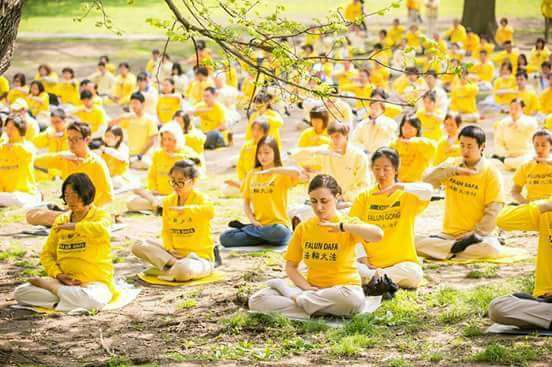
A group of Falun Gong practitioners are meditating.
March 14, 2019 Updated: March 14, 2019
WASHINGTON—The State Department’s annual Country Reports on Human Rights Practices, released on March 13, highlighted China as one of the worst human rights abusers and may have signaled there will be a future investigation of forced organ harvesting in the country.
Presenting the report at the State Department, Secretary of State Mike Pompeo said China was in “a league of its own when it comes to human rights violations.”
“In just 2018, China intensified its campaign of detaining Muslim minority groups at record levels. Today, more than one million Uyghurs, ethnic Kazakhs, and other Muslims are interned in re-education camps designed to erase their religious and ethnic identities,” he said.
The report lists dozens of different serious rights abuses in China, including “arbitrary or unlawful killings by the government; forced disappearances by the government; torture by the government; arbitrary detention by the government; harsh and life-threatening prison and detention conditions; political prisoners,” and many others.
Ambassador Michael Kozak of the Bureau of Democracy, Human Rights, and Labor, said at a press conference on March 13 at the Foreign Press Center in Washington, “From Xinjiang, where you’ve got hundreds of thousands or millions of people in camps, to the treatment of Falun Gong, to house churches, you go across the board. The situation in China has not gotten better, it’s gotten a lot worse over the last several years. “
Kozak said, “We do raise these issues with the Chinese authorities when we see them…what we are trying to do is just raise the level of attention to these issues.”
Kozak believes that international pressure “does have some effect.” In the case of Xinjiang, the Chinese authorities changed their position from denying the existence of the “re-education camps” to admitting it, although they then claimed that they are “vocational training camps.”
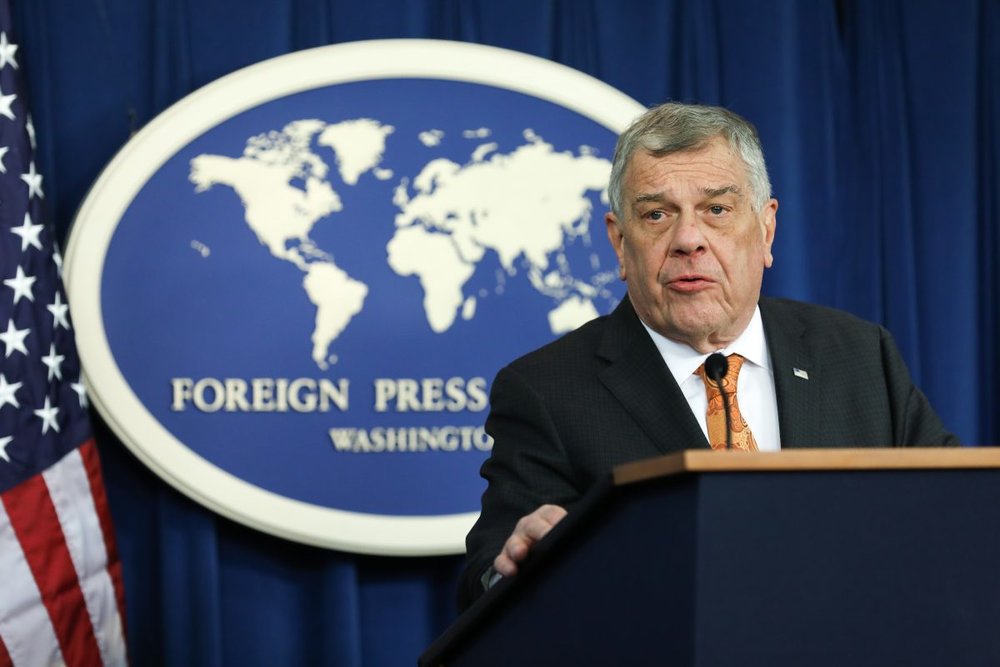
Ambassador Michael Kozak, Bureau of Democracy, Human Rights, and Labor, speaks at the Foreign Press Center in Washington on March 13, 2019. (Samira Bouaou/The Epoch Times)
Ambassador Michael Kozak, Bureau of Democracy, Human Rights, and Labor, speaks at the Foreign Press Center in Washington on March 13, 2019. (Samira Bouaou/The Epoch Times)
The report also identified the issue of organ harvesting in China, about which the House of Representatives unanimously passed Resolution 343 in June 2016, “expressing concern regarding persistent and credible reports of systematic, state-sanctioned organ harvesting from non-consenting prisoners of conscience in the People’s Republic of China, including from large numbers of Falun Gong practitioners and members of other religious and ethnic minority groups.”
The report says, “Some activists and organizations continue to accuse the government of involuntarily harvesting organs from prisoners of conscience, especially members of Falun Gong.”
David Matas, international human rights lawyer, co-author of “Bloody Harvest/The Slaughter,” said to The Epoch Times that this is “a noteworthy development.”
“The mention by the Department of State…of reports of organ harvesting of prisoners of conscience, primarily Falun Gong, is an indication of the seriousness with which the reports are taken. “
Matas said, “there is an implicit, albeit belated link, here to the House of Representative’s June 2016 resolution calling for an investigation by the Department of State.”
Among 6 items expressed in House Resolution 343, the 6th one directly addresses the Department of State:
“That the House of Representatives… calls on the United States Department of State to conduct a more detailed analysis on state-sanctioned organ harvesting from non-consenting prisoners of conscience in the annual Human Rights Report, and report annually to Congress on the implementation of section 232 of the Department of State Authorization Act, Fiscal Year 2003 (8 U.S.C. 1182f), barring provision of visas to Chinese and other nationals engaged in coerced organ or bodily tissue transplantation.”
Matas said, “The investigation has not yet been done. But when the Department of State itself says that there is a serious issue here, it is hard for them then to say they will not investigate. This year’s Department of State report may be a prelude to an investigation. At the very least, it adds leverage to the Congressional request for an investigation.”
However, journalist and researcher Ethan Gutmann, author of “Losing the New China” and “The Slaughter,” criticized the State Department for “parroting Chinese official assurances of transplant reform while over one million blood-tested Uyghurs are incarcerated in ‘reeducation’ camps.”
David Kilgour, former Canadian secretary of state for Asia-Pacific, co-author of Bloody Harvest/The Slaughter, said: “The United States should advance its concern about the worsening state of human rights across China at every bilateral and multilateral opportunity, just as it did with the Soviet Union in the 1970s and ’80s.
“Relinking human rights with trade talks, applying the Magnitsky Act to surgeons and others participating in organ abuse, and warning U.S. universities about the risk of training surgeons from China, and so on, would all help.”
Zhang Erping, spokesperson for Falun Gong, said, “Beijing is perfecting its methods of persecution used against Falun Gong practitioners over the years to suppress other groups lately. China is the only country on earth that spends more money on domestic security than its national defense”, and “The U.S. must stand firm on its moral grounds and protect human rights around the world, China in particular.”
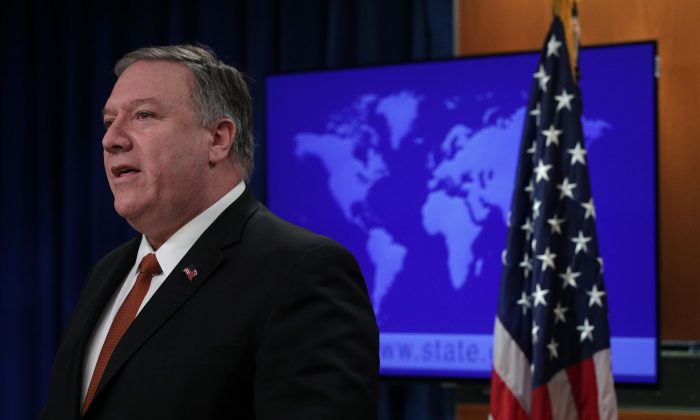
U.S. Secretary of State Mike Pompeo speaks on the release of the 2018 Country Reports on Human Rights Practices in the press briefing room of the State Department in Washington on March 13, 2019. (Alex Wong/Getty Images)
https://www.theepochtimes.com/us-human-rights-report-calls-out-china-acknowledges-organ-harvesting_2838709.html
March 11, 2019 | By practitioners in Israel
(Minghui.org) Jennifer Zeng, a journalist and human rights activist who has been active in raising awareness around the world about the persecution of Falun Gong practitioners in China, visited Israel in early February 2019.
Jennifer, a Falun Gong practitioner herself, was arrested for her belief and sent to a forced labor camp, where she endured horrific torture. Jennifer fled China in 2001 and was granted political asylum in Australia. She has since been telling her story—as in her book, published in 2005—by giving lectures, meeting with public figures, and providing media interviews.
Falun Gong is a spiritual practice that includes five meditative exercises. It is based on the principles of Truthfulness, Compassion, and Forbearance. Falun Gong is taught free of charge throughout the world. It became the most popular cultivation practice method throughout China, and many practitioners gained physical and mental health from it.
Surveys done by the Chinese Communist Party (CCP) in 1999 showed that there were about 100 million Falun Gong practitioners in the country. Jiang Zemin (then head of the Party), fearing its growing popularity across China, started a brutal persecution of Falun Gong. Those who practiced it were fired from their jobs and sent to forced labor camps, prisons, and brainwashing centers, where they were brutally tortured. Research and evidence show that Falun Gong practitioners in China are also subjected to forced organ harvesting, their organs being sold for transplant surgeries—with many patients coming from overseas because of the high availability of organs in China.
The film Free China: The Courage to Believe was screened in Ramat Hasharon, a city in Israel’s central coast area. The film is a documentary starring Jennifer Zeng that tells her story. The mayor of the city was present for the screening.
When Jennifer stepped onto the stage, the audience greeted her with warm applause. In response to questions from the audience, she described the suffering her family and other families of practitioners in China have experienced. She also talked about the current situation of the crime of forced organ harvesting being committed against Falun Gong practitioners and other prisoners of conscience in China. Some in the audience were appalled to hear that the city of Tianjin, which currently houses the largest organ implantation center in East Asia, has a sister city in Israel.
Many people approached Jennifer after the event to express their support, and to thank her. The mayor asked to have a photograph taken with her that he later published on his Facebook page.

Jennifer Zeng answers questions following the screening of the film “Free China” in Ramat Hasharon, Israel on Feb 7, 2019.

Screening of the film “Free China” in Ramat Hasharon, Israel on Feb 7, 2019.

Jennifer with Avi Gruber, mayor of Ramat Hashasharon, Israel, after a successful Free China: The Courage to Believe screening in Israel on Feb 7, 2019.
The following day in the city of Hud Hasharon, the film was screened in a private home, followed by a meeting with Jennifer. It was a meeting of an Academic Women’s Association that provides scholarships and grants to various projects, aiming to empower women.
There was complete silence in the room when the screening was over. Jennifer then sat down in front of the spectators, who asked many questions. People were curious to learn about her life today and about her family still living in China. Many questions were raised about Falun Gong, the ongoing persecution, and the CCP’s motivation to persecute Falun Gong.
The discussion lasted more than an hour.

Free China screening in the city of Hud Hasharon in Israel, at שירי מלכה ‘s home on on Feb 9, 2019.

Free China screening in the city of Hud Hasharon in Israel, at שירי מלכה ‘s home on on Feb 9, 2019.

Free China screening in the city of Hud Hasharon in Israel, at שירי מלכה ‘s home on on Feb 9, 2019.

Free China screening in the city of Hud Hasharon in Israel, at שירי מלכה ‘s home on on Feb 9, 2019.
Jennifer told her story to hundreds of people on Sunday evening, February 10, at an Epoch Times Israel event held in Herzliya, a city in Israel in the central coastal area.
Jennifer was one of nine lecturers that evening. When she told her story, the audience appeared mesmerized and applauded enthusiastically, some giving a standing ovation, when she was finished.
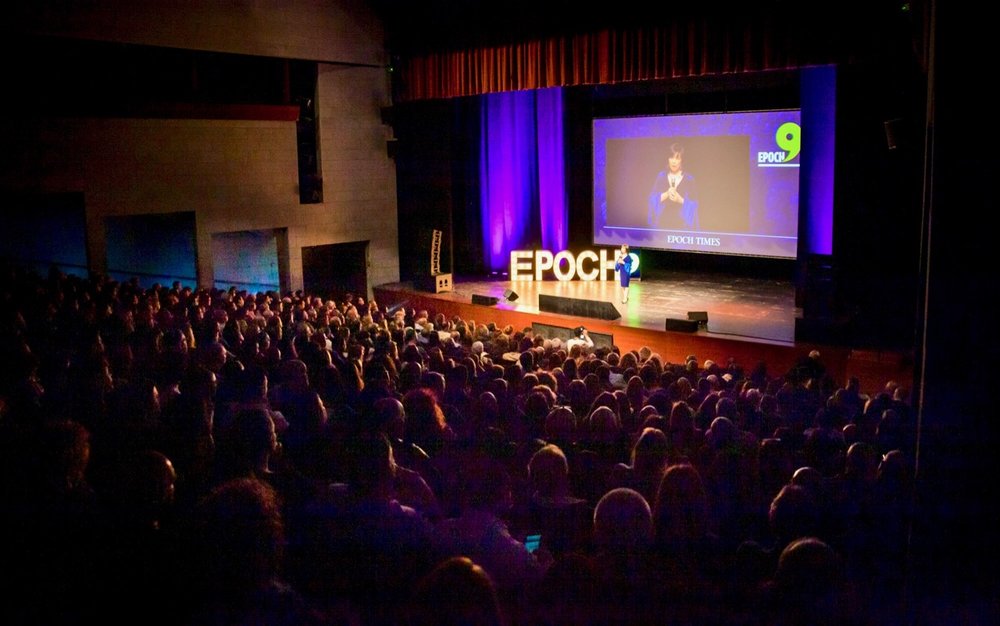
Jennifer Zeng at the Epoch Times event tells how she was persecuted for practicing Falun Gong.

Jennifer Zeng at the Epoch Times event tells how she was persecuted for practicing Falun Gong.
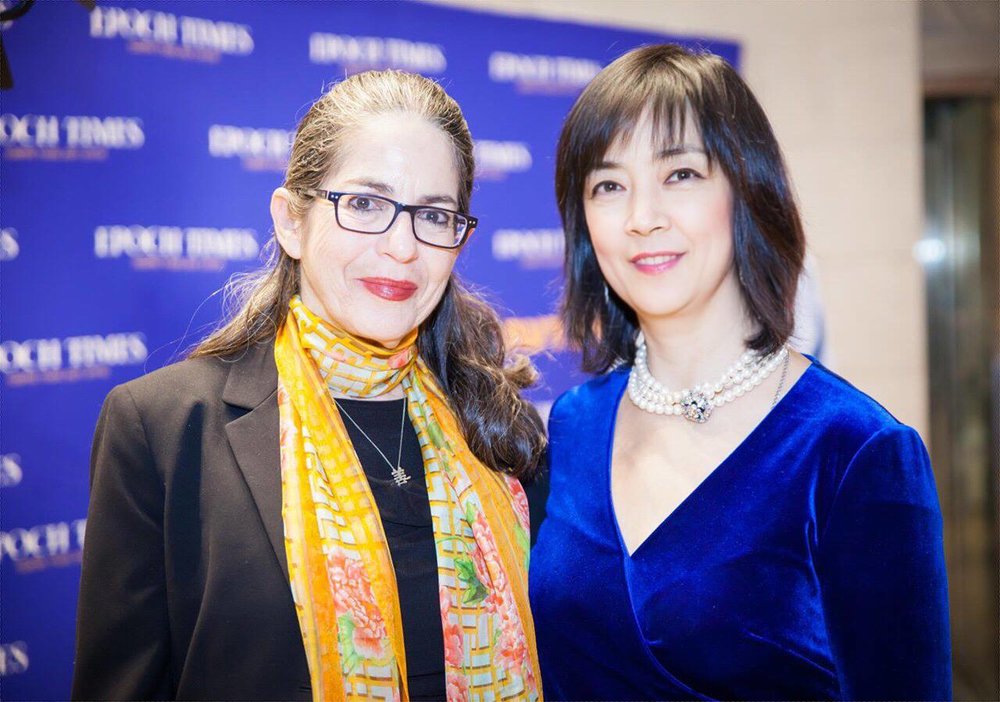
Jennifer Zeng at the Epoch Times event.
Free China was screened at the Tel Aviv Cinematheque, with the audience comprised mainly of Cinematheque subscribers. Human rights documentaries are common at the Cinematheque, but this time, viewers had the opportunity to meet in person the main subject of the film, Jennifer Zeng, right after the screening.
Jennifer sat on the stage, accompanied by the host, who translated her words into Hebrew. She spoke about her present life and answered questions. The hall was packed and many hands were raised. The microphone was passed from one person to another, and the questions flowed. When someone in the audience asked her to demonstrate one of the Falun Gong exercises, she stood up in her high heels and purple evening dress and did so.

Jennifer Zeng at the panel discussion after the screening of the movie “Free China” at the Tel Aviv Cinematheque.

Jennifer Zeng at the panel discussion after the screening of the movie “Free China” at the Tel Aviv Cinematheque.

Jennifer Zeng at the panel discussion after the screening of the movie “Free China” at the Tel Aviv Cinematheque.

Jennifer Zeng demonstrating the second exercise of Falun Gong, Falun Standing Stance(http://en.falundafa.org/eng/html/dymf_2014/dymf_2014_2.htm#2) at the panel discussion after the screening of the movie “Free China” at the Tel Aviv Cinematheque.
The day after the screening at the Cinematheque, Jennifer arrived at the Channel 11 studio (one of the three main Israeli television channels) for an interview that lasted about nine minutes. Jennifer opened the interview by talking about what Falun Gong is.

Jennifer Zeng at the Channel 11 studio.
The interviewer asked many questions about what she had endured in the forced labor camp, where she was tortured. She answered all of his questions honestly and bravely.
Jennifer also met with councilors in the municipalities of Tel Aviv and Haifa, two major cities in Israel.
Jennifer’s participation in the many interviews and meetings during her visit to Israel has helped thousands of Israelis to learn about the persecution of Falun Gong practitioners that is still taking place in China today.
source: http://en.minghui.org/html/articles/2019/3/11/176117.html
【大紀元2019年03月15日訊】(英文大紀元記者Jennifer Zeng報導,記者穆清編譯)美國國務院3月13日發布2018年度《人權國別報告》,並點名中國(中共)是迫害人權最嚴重的國家之一。有專家表示,國務院此舉可能暗示未來將對中共的強摘器官進行調查。
美國國務卿蓬佩奧(Mike Pompeo)在報告發布會上說,中國(中共)在侵犯人權的問題上「無以復加」。
「僅在2018年,中國關押穆斯林少數群體的運動達到空前規模。今天有100多萬維吾爾族人、哈薩克族人以及其他穆斯林被拘留在再教育營,旨在消除他們的宗教和民族特徵。」他說。
2018年《中國人權報告》列舉了中共數十種不同的嚴重侵犯人權的行為,包括「任意剝奪生命或非法殺害、強制失蹤、酷刑、 任意逮捕或關押、關押政治犯和刑事犯的監獄及拘押中心通常條件惡劣且有辱人格」。
同日,美國國務院民主、人權和勞工局(Bureau of Democracy,Human Rights and Labor)的副助理國務卿邁克爾.科扎克(Michael Kozak)在國家新聞俱樂部新聞發布會上表示,「從新疆「再教育營」到法輪功學員的遭遇,再到家庭教會,你可以全面的看到——中國的(人權)情況並沒有好轉,反而較過去幾年變得更糟。」
科扎克說:「在我們跟他們會面時,我們肯定會向中國(中共)當局提出這些問題……我們要做的就是提高外界對這些問題的關注程度。」
科扎克認為,對中共迫害人權的國際壓力「確實在起作用」。在新疆問題上,中共當局的立場已經從否認「再教育營」到承認「再教育營」,儘管他們後來又改稱「職業訓練營」。
中國人權報告再次提出在中國的器官強摘問題。報告說,「一些活動家和組織繼續指責政府從良心犯身上摘取器官,尤其是法輪功成員。」
美國眾議院於2016年6月一致通過了第343號決議,「關切持續、可信的報告發生在中國的、系統性的、政權認可的、從非自願的良心犯身上強摘器官行為,包括從因信仰被關押的大量法輪功學員、其它宗教和少數族裔人士身上。」
國際人權律師大衛‧麥塔斯(David Matas)表示,美國國務院的報告是「一個值得關注的進展」。
「國務院提及……關於摘取良心犯器官的報告,主要是法輪功的報告,說明了報告的嚴肅性。」麥塔斯是《血腥的器官摘取/屠殺》的合作者之一。
麥塔斯說,美國務院人權報告與眾議院2016年6月呼籲國務院進行調查的決議「有一種含蓄的聯繫,儘管有些晚了。」
眾議院第343號決議中的6個決議,其中第6條就直接針對國務院:「要求美國國務院在年度人權報告中對國家批准的從非自願的良心犯身上進行的器官移植進行更加詳盡的分析;就美國法典第8卷的修訂以及禁止向那些參與強摘器官和人體組織的中國人和其它國家的人士提供簽證等方面每年向國會提交報告。」
麥塔斯說:「調查尚未完成。但是,當國務院自己表示這是一個嚴重問題時,他們很難說他們不會進行調查。」
「今年的國務院報告可能是調查的前奏。至少,它為國會的調查請求增加了影響力。」他說。
「失去新中國」和「屠殺」一書的作者、記者和研究員伊森·葛特曼(Ethan Gutmann)則批評國務院的人權報告存在不妥。「在超過一百萬名經過血液檢驗的維吾爾人被關押在再教育營內,(美國國務院報告卻在)重複中共官方關於器官移植改革的保證。」
前加拿大外交部亞太司司長,也是《血腥的器官摘取/屠殺》的合作者大衛‧喬高(David Kilgour)說:「美國應該在每一次雙邊和多邊會面中提升對中國人權狀況惡化的關注, 就像20世紀70年代和80年代的蘇聯一樣。 」
「將人權和貿易談判重新聯繫在一起,把全球馬格尼茨基人權問責法應用於外科醫生和參與器官摘取的其他人;同時警告美國大學培訓來自中國外科醫生的風險等等,這些都會有幫助。」
法輪功發言人張爾平表示,「北京方面正在將其多年來對法輪功學員的迫害手段,轉到壓制其他群體」。
「中國是世界上唯一一個國內維穩支出超過國防支出的國家。」他說。「美國必須堅持自己的道德立場,捍衛世界的人權,特別是保障中國的人權。」#
責任編輯:劉穎

美國國務卿蓬佩奧2019年3月13日在國務院舉行的《2018人權國別報告》的發布會上。(Alex /Getty Iamge)
轉載自:http://www.epochtimes.com/b5/19/3/15/n11115255.htm
BY EDITORIAL TEAM OF “THE NINE COMMENTARIES ON THE COMMUNIST PARTY”
January 27, 2019 Updated: February 10, 2019
The Epoch Times is serializing a translation from the Chinese of a new book, How the Specter of Communism Is Ruling Our World, by the editorial team of the Nine Commentaries on the Communist Party.
Introduction
1. The Communist Roots of Environmentalism
a. The Three Stages of Environmentalism
b. Environmentalism and Marxism: The Same Roots
c. Ecological Marxism
d. Ecological Socialism
e. Green Politics: Green Is the New Red
f. Eco-Terrorism
g. Greenpeace: Not a Peaceful Story
2. The Myth of Consensus on Climate Change
a. A Brief History of ‘Consensus’ in Climate Science
b. Establishing Dogma in the Scientific Community
References
The earth is the living environment of mankind, providing food, resources, and conditions for development. It has allowed humanity to prosper for thousands of years.
Humanity interacts closely with the natural environment. Both traditional Chinese and Western culture emphasize the benign symbiotic relationship between man and nature. As the ancient Chinese philosopher Dong Zhongshu writes in Luxuriant Dew of the Spring and Autumn Annals, “Everything on earth was created for the benefit of man.” [1] The meaning is that the purpose of the Creator was to offer conditions for humanity to live, and all things on earth may be used by man. At the same time, people must follow the principles of heaven and earth in their lives, and thus use everything in moderation and proactively maintain and safeguard the natural environment in which human beings are to live.
Western traditional culture states that the Creator provides the natural environment for human beings and asks them to manage it. Thus, man should cherish and make good use of the natural environment. In the philosophy of traditional Chinese culture, there is a balance between everything, as well as the imperative to avoid harm. The Confucian Doctrine of the Mean states: “It is this same system of laws by which all created things are produced and develop themselves each in its order and system without injuring one another; that the operations of Nature take their course without conflict or confusion. …” [2]
The Chinese ancients valued protection of the environment. According to historical records, at the time of Yu the Great: “In the three months of the spring, people didn’t take axes to the forest so the forest could flourish. In the three months of the summer, people didn’t put nets to rivers so fishes could breed.” [3]
Zengzi, a Confucian scholar, wrote: “Wood could only be cut down in the right seasons and animals only slaughtered at the right time.” [4] These show the traditional Chinese idea of moderation in all things and of cherishing and protecting the natural environment.
After the industrial revolution, industrial pollution caused severe ecological damage, and Western societies began to become aware of the issue. After environmental protection laws and standards were implemented, pollution was effectively treated, and the environment greatly improved. In the process, public awareness of environmental protection grew enormously, and it was widely acknowledged that environmental protection is a proper goal.
We must distinguish between several ideas: environmental protection, environmental movements, and environmentalism. Environmental protection, as the name indicates, is the protection of the environment. Since the beginning of human civilization, people have understood the need to protect the environment, and this had nothing to do with any particular political ideology.
The environmental movement is a social and political movement for environmental issues. Its primary goal is to change environmental policies and public thinking and habits through mass movements, media influence, and political agitation. Environmentalism is a philosophy and ideology emphasizing the need for protecting the environment and the harmonious coexistence between human society and the natural ecology. The motivations behind environmental protection and environmentalism are not the same as communism — but communists excel at hijacking mass movements and manipulating them to their advantage. Thus we see that from the beginning of modern environmentalism, communists have systematically gone about co-opting the movement.
The issues surrounding environmentalism today are extremely complex: The movement has used sensational rhetoric and people’s genuine desire to protect the environment to create a global political movement. Many participants are well-meaning, have a sense of justice, and truly care about the future of mankind.
However, what many don’t recognize is how communists use environmentalism to claim a moral high ground to promote their own agenda. This is how environmental protection becomes highly politicized, made extreme, and even turned into a pseudo religion — but one without traditional moral foundations. Misleading propaganda and various mandatory political measures have become dominant, turning environmentalism into a kind of communism-lite.
This article will focus on how environmentalism as an ideology has become related to communism, and how the environmentalist movement was hijacked, manipulated, and co-opted into serving the goals of communism, as well as the impact this will bring if unchecked.
Communism has made intricate preparations in many fields for the destruction of humanity. Originating in Europe, communism launched violent revolutions and seized power in the two great powers of the East — Russia and China. The communist camp and Western society entered into a long confrontation in the Cold War. After the collapse of the Soviet Union and the Eastern European communist bloc, communists began sowing their factors in both Eastern and Western societies and also sought to establish a tightly controlled global government.
In order to achieve this goal, communism must create or use an “enemy” that threatens all mankind and intimidates the public around the world into handing over both individual liberty and state sovereignty. Creating a global panic about looming environmental and ecological disasters almost appears an inevitable route to achieving this goal.
The formation and development of the environmental movement is inextricably linked to communism. Specifically, its development has gone through three stages. The first stage is the theoretical gestation period, which can be counted from the publication of the Communist Manifesto by Marx and Engels in 1848 to the first Earth Day in 1970.
At the beginning of this stage, Marx and his disciples did not regard environmentalism as the focus of their theoretical discourse, but Marxist atheism and materialism were naturally consistent with the main tendency of environmentalism. Marx declared that capitalism is opposed to nature (that is, the environment). Marx’s disciples devised the term “ecosystem,” and quietly included environmentalism in certain subjects where it was set to ferment.
In the last decade of this phase, from 1960 to 1970, two best-selling books — Silent Spring (1962) and Population Bomb (1968) — appeared in the United States. Environmentalism entered the public arena under the guise of “environmental protection.”
The landmark event at the beginning of the second phase was the first Earth Day held in 1970, with the United Nations shortly after, in 1972, holding the first U.N. Conference on the Human Environment in Stockholm. At this stage, a battery of organizations were rapidly formed and their activities increased. In the United States and Europe, they pushed governments with propaganda, protests, and activism under the guise of scientific research, legislation, meetings, and so on.
At the macro level, the counterculture of the 1960s functioned almost like a military parade of communist elements in the West. They took the stage by co-opting the civil rights and anti-war movements, and then quickly spread to other forms of anti-capitalist battles, including the feminist movement, the homosexual movement, and more.
After the 1970s, after the anti-Vietnam war movement ebbed, communist ideas began their process of institutionalization called “the long march through the institutions,” while also flooding into feminism and environmentalism — and this is the root cause of the upsurge in environmentalist ideology and agitation.
One of the most important forces that shouldered the banner of environmentalism in the 1970s were the hippies, the backbone of the counterculture. In fact, communism was in the process of repackaging itself under the banner of environmentalism after its failure in the Cold War, with the intent to introduce global communism under any other name.
The third phase began on the eve of the end of the Cold War. In 1988, the United Nations set up the Intergovernmental Panel on Climate Change (IPCC), and the concept of global warming began to enter the political realm. [5] On the eve of the collapse of the Soviet Union in 1990, an international environmental conference was held in Moscow. In his speech, the General Secretary of the Communist Party of the Soviet Union, Mikhail Gorbachev, advocated the establishment of an international environmental monitoring system, signed a covenant to protect “unique environmental zones,” expressed support for U.N. environmental programs, and called for a follow-up conference (held in June 1992 in Brazil). [6]
Almost all Western environmentalists accepted these proposals. Global warming became the main enemy of mankind for environmentalists at this stage. Propaganda that used environmental protection as an excuse for heavy-handed policies suddenly escalated, and the number and scale of environmental laws and regulations proliferated rapidly.
Environmentalism has become the main tool for restricting the freedom of citizens around the world, depriving nations of sovereignty, and limiting and fighting against the free societies of the West. The result was that after the end of the Cold War, the former communists of the Soviet Union, as well as the communists and their fellow travelers in the West, all started afresh to join the environmental protection movement. Environmentalism emerged as a force on the world stage and increasingly began to take on a communist color.
In the understanding of believers in orthodox religions of both the East and West, human beings were created by God in his own image, and human life is thus endowed with a higher value, purpose, and dignity than other forms of life on earth. Likewise, the natural environment is created by God. Man has the obligation to care for nature; though simultaneously nature exists for man — not vice versa.
In the eyes of atheists and materialists, however, human life has no such special quality. Engels writes in one of his essays: “Life is the mode of existence of albuminous [i.e. protein] bodies. …” [7] In this view, human life is a no more than a unique configuration of proteins, not different in any essential manner from animals or plants — thus it is only logical that humans may be deprived of freedom, and even their lives, in the name of protecting nature.
In 1862, in a book on organic chemistry, German chemist Justus von Liebig, Marx’s colleague, criticized British farmers for using imported bird droppings as a fertilizer. British agriculture had benefited from bird manure, an efficient fertilizer, and crop yields had significantly increased. By the middle of the nineteenth century, the British had ample high-quality food sources. The bird droppings business had benefited businessmen in various countries, the British farmers, and the British public.
Why did Justus von Liebig want to condemn this practice? His moral indignation was due to four reasons. First, the process of collecting bird droppings damages nature; second, merchants exploit workers with low wages; third, high yields of food stimulate population growth, which in turn requires more food, exceeding what nature can supply; and fourth, more people and livestock mean more manure and garbage. [8]
At the time, while writing Das Kapital, Marx carefully studied Justus von Liebig’s work. He praised it for having “developed from the point of view of natural science, the negative, i.e., destructive, side of modern agriculture.” [9] Like Justus von Liebig, Marx regarded any effort in creating wealth by using natural resources as a vicious cycle, with the conclusion that “a rational agriculture is incompatible with the capitalist system.” [10]
After Lenin and his Bolshevik Party launched a coup in Russia, they quickly promulgated the “Decree on Land” and the “Decree on Forests” to nationalize land, forest, water, mineral, animal, and plant resources, and prevent the public from using them without authorization. [11]
American meteorologist and writer Brian Sussman writes in his book Eco-Tyranny: How the Left’s Green Agenda Will Dismantle America that Marx and Lenin’s ideas are highly consistent with those of today’s environmentalists. In their view, no one has the right to profit from natural resources: “Whether it’s saving the forests, whales, snails, or the climate, it all comes back to a deep-rooted belief that the quest for such profit is immoral and will ultimately destroy the planet unless ground to a halt.” [12]
This global environmental movement has involved a large number of thinkers, politicians, scientists, social activists, and media personalities. This text does not have sufficient space to enumerate their thoughts, speeches, and actions in full, but one figure cannot be ignored. This is the founder of the United Nations Environment Program, Maurice Strong. Strong, a Canadian, also organized the 1972 U.N. Conference on the Human Environment as well as the 1992 U.N. Conference on Environment and Development. Strong is the nephew of Anna Louise Strong, a well-known pro-communist journalist who settled in China. Maurice Strong, who was deeply influenced by his aunt, described himself as “a socialist in ideology and a capitalist in methodology.” [13]
Maurice Strong has come to occupy an important place in the global environmental movement. “He shares the views of the most radical environmentalist street protester, but instead of shouting himself hoarse at a police barricade at a global conference, he’s the secretary general inside, wielding the gavel.”14]
The views espoused by the United Nations Environment Agency led by Strong appear almost identical to Marxism: “Private land ownership is a principal instrument of accumulating wealth and therefore contributes to social injustice. Public control of land use is therefore indispensable.” [15]Maurice Strong chose to settle down in Beijing after retirement and died in 2015.
Natalie Grant Wraga, a late expert on the Soviet Union, conducted an in-depth study on the issue and wrote: “Protection of the environment may be used as a pretext to adopt a series of measures designed to undermine the industrial base of developed nations. It may also serve to introduce malaise by lowering their standard of living and implanting communist values.” [16]In fact, environmentalism does not originate only from the former communist bloc. It goes deeper and relates to the overall goal of communism to undermine the cause of freedom around the world.
At the juncture of the nineteenth and twentieth centuries, British scientists Ray Lankester and Arthur Tansley developed the idea of the ecology and the ecosystem. Both were Fabian Socialists, a variation of Marxism. Lankester was a zoologist and at a relatively young age, became a friend to an aging Marx. When Marx was in his senior years, Lankester frequented Marx’s house and was among the few who attended Marx’s funeral. Lankester once wrote to Marx saying that he was studying Das Kapital “with the greatest pleasure and profit.” [17]
Tansley was the most important figure in ecology and botany during that period in England, and as the first chairman of the British Ecological Society, he was the inventor of the term “ecosystem.” While attending the University of London, Tansley was deeply influenced by Lankester. [18]
The originating links between ecological ideas and Marxism appear to emerge in this connection between Lankester, Tansley, and Marxism — though of course ecology and environmentalism are not the same thing. Ecology is about the relationship between living things and the environment, while environmentalism is concerned with ecological disasters. Ecology, however, is closely related to environmentalism because it provides the theoretical basis for defining ecological disasters. Ecological Marxism, which was derived from ecology, is a further step away from these ideas.
Ecological Marxism adds the concept of ecological crises as an augmentation to Marxian arguments about the economic crisis of capitalism. It seeks to expand the supposed conflict between the bourgeoisie and the proletariat by adding an inherent conflict between production and the environment. This is the theory of double crisis or double conflict. In Marxist theory, the basic conflict of capitalism is between productive forces and the relations of production, which is called the primary conflict. The secondary conflict happens between the environment of production (the ecosystem) and the productive forces and relations of production together. In this theory, the primary conflict leads to economic crisis, while the secondary conflict leads to ecological crisis. [19]
The century-long development of capitalism proved Marxism wrong after the failed prediction that capitalism would collapse due to economic crisis. On the contrary, capitalism continues to prosper. In response, the notion of ecological crises became a tool of communism as leftist scholars discovered that Marxism could be a theoretical basis for environmentalism, thus radicalizing the environmentalist movement and worldview.
As its name suggests, ecological socialism is an ideology combining ecology and socialism. Critics have called it a “watermelon” — green on the outside and red on the inside — for adding typical socialist demands, such as “social justice,” to ecological concerns in an apparent attempt to advance socialist ideology by new means.
A good illustration of ecological socialism is An Ecosocialist Manifesto,published by Joel Kovel and Michael Lowy in 2001. Kovel was unsuccessful in his campaign to become the U.S. presidential candidate from the Green Party. Lowy is a member of the Trotskyist Fourth International. The Manifesto states that capitalism cannot resolve the ecological crisis and will be replaced by ecological socialism. They do not view ecological socialism as a branch of socialism, but rather as the new name of socialism in the new era. [20]
In 2002, Kovel published a book titled The Enemy of Nature: The End of Capitalism or the End of the World? The book detailed the theory of ecological socialism, harshly criticized capitalism, and suggested a change to the current situation with radical new directions. [21]
When environmentalism enters politics, green politics, or ecopolitics, is born. The Green Party established in many countries around the world is a result of green politics, which typically extends beyond environmental protection to social justice, feminism, anti-war activism, and pacifism. Global Greens, for instance, is an international organization associated with the Green Party, and its 2001 charter is heavily inflected with Marxist ideology, including a heavy emphasis on a supposed equality between man and animals. [22]
Environmentalism is usually propelled by socialism and communism. After the fall of communist regimes in Russia and Eastern Europe, many former communist party members and remaining communist forces joined or established green parties, resulting in the leftist ideology of the Green Party, hence the term Green Left.
After the fall of Soviet Communist Party, former Soviet Union leader Gorbachev tried and failed to re-enter politics. He then became an environmentalist and established the Green Cross International. Obviously, Gorbachev would be likely to introduce communist factors into his environmental pursuits, and he often promoted the establishment of a world government in order to stop environmental crisis. [23]
Many communist parties in the West are directly involved in environmental-protection movements. Jack Mundey, one of the founders of Australia’s Green Ban movement, is a member of the Australian Communist Party. His wife is the national chairwoman of the Australian Communist Party. [24]
Due to its leftist influences, environmentalism has been relatively radical from the start. There are many radical branches, including Deep Ecology, Ecofeminism, Social Ecology, Bioregionalism, and the like. Some of these branches are extremely radical. The most well-known include groups like Earth First! and Earth Liberation Front. They utilize direct action (like use of explosives and arson) — known as Eco-Terrorism — to stop activities they consider damaging to the environment.
The Earth First! group was started in 1979, and its slogan is “No Compromise in Defense of Mother Earth!” The group utilizes direct actions against main targets like logging, dam construction, and other projects. One of the group’s well-known tactics is called “tree sit,” where they sit under or climb up trees to prevent logging. These operations of Earth First! have attracted many new members, including leftists, anarchists, and others seeking to rebel against mainstream society.
In 1992, some of the more radical members started a branch called Earth Liberation Front and adopted arson as their tactic. Around the end of 2000, nine luxury mansions on Long Island were burned to ashes overnight. The main justification was that these mansions were built on a natural forest. After committing the arson, the Earth Liberation Front put out the slogan “If you build it, we’ll burn it!”
In 2005, the FBI announced that the Earth Liberation Front was the largest terrorist threat in the United States, was suspected of involvement in over 1,200 criminal incidents causing tens of millions of dollars in property damage. [25] Their actions have long since exceeded the limits of normal political protest or differences in views. Communist ideology has exploited hatred to turn some environmentalists into eco-terrorists, no different from any other terrorists.
Greenpeace was established in 1971 and is the largest environmental organization in the world, with offices in forty countries and income of over $350 million dollars. Greenpeace is also one of the most radical environmental organizations.
Greenpeace co-founder, Paul Watson, who left the organization in 1977, said: “The secret to David McTaggart’s [the former chairman’s] success is the secret to Greenpeace’s success: It doesn’t matter what is true, it only matters what people believe is true… You are what the media define you to be. [Greenpeace] became a myth, and a myth-generating machine.” [26]
Patrick Moore, another co-founder of Greenpeace, was committed to environmental protection. He later quit his position because he found that the organization “took a sharp turn to the political left.” [27] It developed into an extremist organization with a political agenda, such as including hostility toward all industrial production and reflecting an agenda based more on politics than sound science. [28]
The strategy employed by radical environmental organizations such as Greenpeace is to use any means necessary to achieve their goals. On this one point, radical environmentalism is highly consistent with communism. In 2007, six Greenpeace members broke into a British coal power plant to cause disruption. They were sued for causing around 30,000 British pounds of property damage. They admitted their attempt to shut down the power plant, but claimed that they were doing this to prevent even larger damage (an environmental crisis due to greenhouse gases). The court eventually agreed that their actions were innocent.
Before this, Greenpeace already had many such records of court wins, including damaging nuclear power plants, automotive companies, and fighter-jet manufacturing facilities. [29] The boundary between legitimate and illegitimate tactics is simply erased with such logic.
Traditional Marxism-Leninism uses the promise of an eventual utopia to legitimize killing, arson, and robbery. Similarly, under the banner of environmentalism, communists warn of environmental crises in order to legitimize violent and illegal tactics.
In the above example, Greenpeace members successfully persuaded the jury to accept their criminal motives as legitimate, demonstrating that a large group of people in society can be misled into accepting specious and groundless arguments. All of this is part of the abandonment of universal values, and is a sign of the moral downslide of society.
Climate change is a hot topic in today’s society. Public debate about this issue is unusually active, with different opinions from the media, among the general public, and in politics. The most frequently heard argument is that the emission of greenhouse gases by humans has caused global warming that will lead to dangerous climate disasters. Advocates claim that this conclusion is reached through scientific consensus or is already settled science. To some environmentalists, people who reject this conclusion are not only considered anti-science, but also anti-humanity.
The aforementioned Greenpeace members who damaged the power plant were acquitted of their crime because a famous expert who was a proponent of this “consensus” testified for them, claiming that the amount of greenhouse gases emitted by the power plant each day would lead to the extinction of up to four hundred species, and so on.
Has the scientific community really reached a consensus? Retired Massachusetts Institute of Technology meteorology professor Richard Lindzen wrote an article expressing his view that climate science isn’t, in fact, settled. [30]
Steven Koonin, former U.S. Department of Energy Under Secretary for Science and current New York University professor, wrote in his article “Climate Science Is Not Settled”: “We are very far from the knowledge needed to make good climate policy.” [31] In another essay, Koonin reminded readers: “The public is largely unaware of the intense debates within climate science. At a recent national laboratory meeting, I observed more than 100 active government and university researchers challenge one another as they strove to separate human impacts from the climate’s natural variability. At issue were not nuances but fundamental aspects of our understanding [of climate], such as the apparent—and unexpected—slowing of global sea-level rise over the past two decades.” [32]
In general, the surface temperature of the earth has risen on the whole since 1880, and carbon dioxide and other greenhouse gases emitted into the atmosphere by humans have a warming effect on the world. Regarding these basic questions, scientists do not differ in their opinions. However, the more important questions, which are questions that are hotly debated by scientists, are these: Is warming primarily caused by human activity or due to natural factors? How warm will the world be by the end of the twenty-first century? Does humanity have the ability to predict how climate will change in the future? Will warming cause a disaster?
From another perspective, however, the scientific community does appear to have achieved some sort of consensus or to have settled the science of climate change to a certain extent, for the voices of those who oppose the so-called consensus seldom appear in the media or academic journals.
Physicist Michael Griffin, a former NASA administrator, said in an interview with National Public Radio (NPR) in 2007:
I have no doubt that global—that a trend of global warming exists. I am not sure that it is fair to say that it is a problem we must wrestle with. To assume that it is a problem is to assume that the state of earth’s climate today is the optimal climate, the best climate that we could have or ever have had and that we need to take steps to make sure that it doesn’t change.
First of all, I don’t think it’s within the power of human beings to assure that the climate does not change, as millions of years of history have shown, and second of all, I guess I would ask which human beings—where and when—are to be accorded the privilege of deciding that this particular climate that we have right here today, right now is the best climate for all other human beings. I think that’s a rather arrogant position for people to take. [33]
Although Griffin was trying to express the humility that people should have regarding science, he immediately encountered severe criticism by the media and some climate scientists, who even called his remarks ignorant. The next day, under immense pressure, he was forced to apologize. [34]
A few months later, in another interview, Griffin commented: “I personally think people have gone overboard in the discussion of climate change, to the point where it has become almost not legitimate to view it as a technical subject. It has almost acquired religious status, which I find deplorable.” From Griffin’s view regarding “scientific consensus,” we see that the so-called consensus regarding climate change wasn’t in fact part of the scientific process. He felt scientific progress is the result of debate: “You develop your theories, publish your data, advance your concept, and others shoot it down, or try to. Scientific consensus evolves in that way.” [35] The use of all manner and means to stifle scientific debate itself violates the spirit of science.
Due to his stellar reputation and standing in his field, professor Lennart Bengtsson, a Fellow of the British Royal Meteorological Society and former director of the European Centre for Medium-Range Weather Forecasts (ECMWF), joined the Global Warming Policy Foundation (GWPF, a think-tank that challenges global warming theories). As a result, he faced intense scrutiny and pressure from his peers around the world. Two weeks later, he was forced to resign.
In his letter of resignation, Bengtsson wrote: “I have been put under such an enormous group pressure in recent days from all over the world that has become virtually unbearable to me. If this is going to continue I will be unable to conduct my normal work and will even start to worry about my health and safety. … Colleagues are withdrawing their support, other colleagues are withdrawing from joint authorship, etc. … I would never have expect[ed] anything similar [to the time of Sen. McCarthy] in such an original peaceful community as meteorology. Apparently it has been transformed in recent years.” [36]
Bengtsson’s observation was correct: This “transformation in recent years” was the result of communist ideology and struggle tactics hijacking the field of meteorology.
In reality, the alleged scientific consensus regarding climate change has transformed climate-change theory into dogma. Climate change is also a crucial tenet of today’s environmentalism — sacrosanct and inviolable. The scientists, media, and environmental activists who accept this tenet work together in spreading fear of imminent disaster. This doctrine is an important tool used by the environmentalist movement to frighten the public into obeying a political agenda. Through the process of establishing and solidifying this dogma, the techniques of communist-style political struggle, including deception, mobbing, public shaming, call-outs, and open conflict are all apparent.
In 1988, the Intergovernmental Panel on Climate Change (IPCC) was established. One of its important missions was to evaluate the existing scientific research about every five years and release an authoritative statement on climate change. It was supposed to establish a scientific consensus on climate issues and provide the scientific basis for policymaking. [37] The IPCC’s report often encloses a list of thousands of first authors, co-authors, and reviewers. Hence the conclusions in the IPCC reports are often described as the consensus of thousands of the world’s top scientists.
In 1992, the United Nations Framework Convention on Climate Change (UNFCCC) stated that its goal was to achieve stabilization of greenhouse gas concentrations in the atmosphere at a level that would prevent dangerous anthropogenic interference with the climate system. One must note that it was already assumed that climate change was caused by humans and was dangerous. Later on, the IPCC was tasked with identifying human influences on climate, dangerous environmental and socio-economic impacts of climate change. [38]
When the UNFCCC assumes that people are the culprits of dangerous climate change, it has restricted the direction of what the IPCC should identify. Also, if climate change wasn’t dangerous or wasn’t caused solely by industry, then policymaking wouldn’t be needed, and there would be no reason for the IPCC to exist. Such conflicts of interest also restricted the focus of the IPCC’s inquiry. [39]
IPCC Reports Removed Statements of Uncertainty
Right before the IPCC released its Second Assessment Report in 1995, Dr. Frederick Seitz, a world-renowned physicist, former president of the National Academy of Sciences, and president of New York’s Rockefeller University, obtained a copy of the report. Seitz later discovered that the content in the report was largely altered after it passed scientific review and before it was sent for print. All of the uncertainties of human activities about climate change were deleted.
Seitz’s article in The Wall Street Journal stated: “In my more than 60 years as a member of the American scientific community, … I have never witnessed a more disturbing corruption of the peer-review process than the events that led to this IPCC report.” [40]
The deleted statements include the following: [41]
“None of the studies cited above has shown clear evidence that we can attribute the observed [climate] changes to the specific cause of increases in greenhouse gases.”
“No study to date has positively attributed all or part [of the climate change observed to date] to anthropogenic [man-made] causes.”
“Any claims of positive detection of significant climate change are likely to remain controversial until uncertainties in the total natural variability of the climate system are reduced.”
Though later the IPCC claimed that all the modifications were approved by the authors, the alterations reveal how the IPCC’s reporting was influenced by politics. The evaluation report doesn’t contain any original research, but mostly summarizes existing research. Because the existing research contains so many different views, in order to “reach consensus,” as it set out to do, the IPCC simply got rid of the opposing views.
In April 2000, the IPCC’s Third Assessment Report said in its draft, “There has been a discernible human influence on global climate.” The version published in October that same year says: “It is likely that increasing concentrations of anthropogenic greenhouse gases have contributed significantly to observed warming over the past 50 years.” In the final, official conclusion, the statement was even stronger: “Most of the observed warming over the last 50 years is likely to have been due to the increase in greenhouse gas concentrations.”
When the U.N. Environment Programme’s spokesman, Tim Higham, was asked about the scientific basis of the rhetorical changes, his answer was honest: “There was no new science, but the scientists wanted to present a clear and strong message to policymakers.” [42]
Put another way, the UNFCCC gave a homework assignment to the IPCC, making the answer they wanted clear. The IPCC then delivered as required.
IPCC Report Overstated ‘Disaster Consensus’
Paul Reiter, a professor at the Pasteur Institute in France, is a leading expert on malaria and other insect-borne diseases. He disagreed with the IPCC report, and had to threaten to initiate a lawsuit against the IPCC in order to remove his name from the list of the top two thousand scientists who are said to have endorsed the report. He said that the IPCC “make[s] it seem that all the top scientists are agreed, but it’s not true.” [43]
In his testimony to the United States Senate on April 25, 2006, Reiter said: “A galling aspect of the debate is that this spurious ‘science’ is endorsed in the public forum by influential panels of ‘experts.’ I refer particularly to the Intergovernmental Panel on Climate Change (IPCC). Every five years, this U.N.-based organization publishes a ‘consensus of the world’s top scientists’ on all aspects of climate change. Quite apart from the dubious process by which these scientists are selected, such consensus is the stuff of politics, not of science. ” [44]
Environmentalists have been promoting the notion that insect-borne diseases such as malaria will wreak havoc when climate warming continues, which is also the main argument of the IPCC. As Bloomberg stated on November 27, 2007, “Global warming will put millions more people at risk of malaria and dengue fever, according to a United Nations report that calls for an urgent review of the health dangers posed by climate change.” [45] But Reiter does not acknowledge this simple correlation between climate warming and the spread of infectious diseases.
He pointed out that malaria is not confined to tropical areas. A massive outbreak of malaria occurred in the former Soviet Union in the 1920s, and another one in the city of Archangel (Arkhangelsk) near the Arctic Circle, where there were thirty thousand malaria cases causing ten thousand deaths. [46] According to a 2011 report in Nature, scientists found that, contrary to the previous assumption, malaria transmission from mosquitoes slows with rising temperatures. [47] This confirms Reiter’s opinion.
Another scientist’s withdrawal from the IPCC also shows that it has used alleged “disaster consensus” as part of its operational culture. Christopher Landsea, a hurricane researcher at the U.S. Oceanic and Atmospheric Administration and one of the leading authors of the IPCC’s fourth assessment report, withdrew from the IPCC in January 2005. In an open letter, he stated, “I personally cannot in good faith continue to contribute to a process that I view as both being motivated by preconceived agendas and being scientifically unsound.” He urged the IPCC to confirm that the report would adhere to science rather than sensationalism. [48]
Landsea disagrees with the lead author of the IPCC report regarding the relationship between hurricanes and climate change. The IPCC lead author (who is not an expert in hurricane research) stressed that climate warming would cause more intense hurricanes, without solid factual data to support his claim. Landsea pointed out that past studies have shown that historical records could not verify such a correlation; theoretically, even if there is a correlation, it is insignificant and negligible.
David Deming, a geologist and geophysicist at the University of Oklahoma, obtained the 150-year historical temperature data for North America by studying ice cores, and published his research article in Science. Consensus advocates then regarded Deming as an exponent of consensus. In a U.S. Senate hearing, Deming said that an IPCC lead author sent him an email saying, “We have to get rid of the medieval warm period.” [49] The medieval warm period refers to the climate warming of the North Atlantic region between around A.D. 950 and 1150. Erasing this period in the historical curve of climate change would strengthen the claim that today’s warming is unprecedented.
There are many such incidents. In his book Red Hot Lies, How Global Warming Alarmists Use Threats, Fraud, and Deception to Keep You Misinformed, Christopher C. Horner, a senior American researcher at the Competitive Enterprise Institute, listed many of the original IPCC authors who oppose the IPCC’s conclusions and its politicized operations. [50] They have raised reasonable questions with supporting data and have challenged the IPCC’s so-called consensus. However, in the current academic and media environment, their voices have been marginalized.
The establishment and consolidation of the alleged consensus on climate change is a main step in the use of environmentalism to manipulate the public, amplify the sense of disaster, and distort human values. If carried to its conclusion, the natural trajectory is the establishment of a global super-government — that is, communism. While this has mainly played out in the scientific community, it has been helped along with the joint strength of the media, government, and academic institutions.
No matter the academic reputation of a scientist, once he publicly expresses doubts about the consensus dogma, he immediately faces tremendous pressure from his peers and academic institutions, forcing him to submit. People who have lived in a communist totalitarian society have had similar experiences, the only difference being that they have questioned communist party dogma.
David Bellamy is a well-known British environmental activist and chairman of the The Royal Society of Wildlife Trusts. But when he publicly stated that he did not believe in the consensus dogma of global warming theory, the agency issued a statement expressing dissatisfaction. [51] He then ceased to serve as the chairman, and environmentalists who previously respected him began to suspect he’d lost his senses or was taking money from Big Oil. [52]
Henk Tennekes, former director of the Royal Dutch Meteorological Society, was dismissed because he did not support the consensus dogma on climate change. Similarly, World Meteorological Organization official Aksel Winn-Nielsen was slandered by IPCC officials as “an industry tool.” After Italian researchers Alfonso Sutera and Antonios questioned the theory of anthropogenic climate warming, they were no longer able to obtain research funding. [53]
In his book Climate of Extremes: Global Warming Science They Don’t Want You to Know, Patrick J. Michaels, past president of the American Association of State Climatologists and a climatologist at the University of Virginia, listed numerous examples of environmentalists suppressing scientific dissidents in order to reach their alleged consensus. Because he insisted that the climate would not lead to disaster, this optimistic stance was inconsistent with the consensus dogma, and one day he was told by the governor that he could not speak on global warming as a state climatologist. He ultimately chose to resign.
Another state climatologist, George Taylor of Oregon State University, encountered the same trouble, and Taylor was eventually forced to resign. Dr. David Legates, former director of the Center for Climate Studies at the University of Delaware, is a state climatologist in Delaware. He was also told by the governor that he could not speak as a state climatologist on the issue of global warming. Washington State climatologist assistant Mark Albright was fired because he emailed an inquiring journalist and citizens of the state about the entire snowfall record for the Cascade Mountains, instead of selecting partial records (which appear to show warming), despite having been warned by his boss. [54]
The focus of debate here is on the climatologists’ area of expertise — climate science issues rather than state-policy issues. In communist countries, crude political interference in science is common. In Western countries, environmentalist politics are being used to interfere with academic freedom.
Academic research that casts doubt about the consensus dogma is rarely seen in academic journals, a phenomenon that began in the 1990s. Michaels said in the Channel 4 (U.K.) 1990 documentary The Greenhouse Conspiracythat if a person’s point of view is politically unacceptable, then there will be trouble. His paper was rejected by more than one academic journal. When he asked a journal editor why, the answer was that his paper must pass a higher evaluation standard than others.
According to the 1990 IPCC report, the understanding at the time was that the extent of global warming was equivalent to natural changes in climate. Therefore, although Michaels’s point of view was different from that of many others, it could not be regarded as particularly heretical. However, the goal of establishing a false consensus had already been set, and everyone had to get on board.
The tilt of government funding has greatly contributed to the formation and consolidation of the alleged consensus. The hypothesis that humans caused global warming and brought disasters has pushed climate-change research to the position of advising on policymaking. Therefore, research supporting this hypothesis will naturally receive a large amount of research funding, and a large number of academic articles will be published. Conversely, enforced consensus hinders scientists from exploring and researching in other possible directions.
Dr. William Gray, a renowned professor, was a pioneer of American hurricane research. Because he criticized the consensus dogma in climate theory, he suddenly found that his applications for research funding were repeatedly rejected. The reason was that his proposed research was not the focus. [55]
In March 2008, many scientists who doubted the consensus dogma on climate issues held a private academic event in New York. These scientists said that they encountered various obstacles when trying to publish their research results in academic journals. Meteorologist Joseph D’Aleo, former chairman of the American Meteorological Society’s Committee on Weather Analysis and Forecasting, said that some of his colleagues did not dare to attend the meeting because of fear of being fired. He believed that there was “very likely a silent majority” of scientists in climatology, meteorology, and related sciences who did not support the “consensus” position. [56]
Professor Judith Curry, former dean of the School of Earth and Atmospheric Sciences at the Georgia Institute of Technology, stated in a Senate testimony in 2015 that a scientist employed by NASA said to her: “I was at a small meeting of NASA-affiliated scientists and was told by our top manager that he was told by his NASA boss that we should not try to publish papers contrary to the current global warming claims, because he (the NASA boss) would then have a headache countering the ‘undesirable’ publicity.” [57]
Curry further said in her testimony: A climate scientist making a statement about uncertainty or degree of doubt in the climate debate is categorized as a denier or a ‘merchant of doubt,’ whose motives are assumed to be ideological or motivated by funding from the fossil fuel industry. My own experience in publicly discussing concerns about how uncertainty is characterized by the IPCC has resulted in my being labeled as a ‘climate heretic’ that has turned against my colleagues. … There is enormous pressure for climate scientists to conform to the so-called consensus. This pressure comes not only from politicians, but from federal funding agencies, universities and professional societies, and scientists themselves who are green activists and advocates. Reinforcing this consensus are strong monetary, reputational, and authority interests. [58]
Dr. Curry is a member of the American Meteorological Society and a member of the National Research Council’s Climate Research Committee. Despite her academic success, she chose to retire early because she was unwilling to continue to live under such pressure. Because she has challenged the IPCC’s “consensus” in recent years, she has been stigmatized as “anti-science,” a “denier,” and so on, both by media, other scientists, and a senator. A member of Congress even sent a letter to the Dean of the Georgia Institute of Technology to question Curry’s motives. [59] She said that another reason for early retirement was that she felt that she could not tell students and postdoctoral researchers how to “navigate the CRAZINESS in the field of climate science.” [60]
Roger Pielke Jr., a professor at the University of Colorado, has worked with Curry on climate-change issues. He was originally at the university’s Cooperative Institute for Research in Environmental Sciences (CIRES). Although he agreed with most of the IPCC “consensus” conclusions, he was subjected to similar pressures because he pointed out that data does not support the idea that extreme weather events such as hurricanes, tornadoes, and droughts are influenced by climate change. He eventually moved to the University of Colorado’s Sports Governance Center. [61]
Dr. Pielke pointed out that Curry’s experience shows that “having a tenured position isn’t a guarantee of academic freedom.” [62] It is no wonder that Joanne Simpson, an academician of the American Academy of Engineering and an outstanding former NASA atmospheric scientist, declared her skepticism of the “consensus” after retirement: “Since I am no longer affiliated with any organization nor receive any funding, I can speak quite frankly.” She said, “As a scientist, I remain skeptical.” [63]
[1] Dong Zhongshu, Luxuriant Dew of the Spring and Autumn Annals, Images for the regulation of dress, 14.董仲舒:《春秋繁露·服制象》,第十四,https://ctext.org/chun-qiu-fan-lu/fu-zhi-xiang/zh. The line in question appears both as “天之生物也,以养人” and “天地之生萬物也以養人.” [In Chinese]
[2] Confucius, The Universal Order or Conduct of Life, a Confucian Catechism, “Being a Translation of One of the Four Confucian Books, Hitherto Known as the Doctrine of the Mean” (The Shanghai Mercury, Limited, 1906), 68. https://bit.ly/2T74Dsb
[3] Lost Book of Zhou. Da Jujie.《逸周書·大聚解》, https://ctext.org/lost-book-of-zhou/da-ju/zh. [In Chinese]
[4] The Classic of Rights. Zhai Yi.《禮記·祭儀》,https://ctext.org/text.pl?node=61379&if=gb&show=parallel. [In Chinese]
[5] Rupert Darwall, The Age of Global Warming: A History (London: Quartet Books Limited, 2013), Chapter 1.
[6] Wes Vernon, “The Marxist Roots of the Global Warming Scare,” Renew America, June 16, 2008, https://web.archive.org/web/20100724052619/http://www.renewamerica.com:80/columns/vernon/080616.
[7] Frederick Engels, “Notes and Fragments,” Dialectics of Nature, 1883, accessed December 28, 2018, https://www.marxists.org/archive/marx/works/1883/don/ch07g.htm.
[8] Brian Sussman, Eco-Tyranny: How the Left’s Green Agenda Will Dismantle America (Washington, D.C.: WND Books, 2012), 8–9.
[9] Ibid., 10.
[10] Ibid., 11.
[11] Ibid., 14–15.
[12] Ibid., 11.
[13] Grace Baumgarten, Cannot Be Silenced (WestBow Press, 2016), Available: http://j.mp/2HgHJ0q
[14] Wes Vernon, “The Marxist Roots of the Global Warming Scare,” Renew America, June 16, 2008, https://web.archive.org/web/20100724052619/http://www.renewamerica.com:80/columns/vernon/080616.
[15] Sussman, Eco-Tyranny, 35.
[16] Vernon, “The Marxist Roots.”
[17] Lewis S. Feuer, “The Friendship of Edwin Ray Lankester and Karl Marx: The Last Episode in Marx’s Intellectual Evolution,” Journal of the History of Ideas 40 (4): 633–648.
[18] John Bellamy Foster, “Marx’s Ecology in Historical Perspective,” International Socialism Journal 96, Winter 2002,http://pubs.socialistreviewindex.org.uk/isj96/foster.htm.
[19] James O’Connor, “Capitalism, Nature, Socialism: A Theoretical Introduction,” Capitalism, Nature, Socialism 1, no. 1 (1988): 11–38, http://www.vedegylet.hu/okopolitika/O%27Connor%20-%20Capitalism,%20Nature,%20Socialim.pdf.
[20] Joel Kovel and Michael Löwy, “The First Ecosocialist Manifesto,” September 2001,http://green.left.sweb.cz/frame/Manifesto.html.
[21] Joel Kovel, The Enemy of Nature: The End of Capitalism or the End of the World? (London: Zed Books, 2002).
[22] Kevin Andrews, “The Ideological Drive Behind the Greens,” ABC News, November 11, 2010, http://www.abc.net.au/news/2010-11-12/the_ideological_drive_behind_the_greens/41010.
[23] Mikhail Gorbachev, “We Have a Real Emergency,” The New York Times, December 9, 2009, http://www.nytimes.com/2009/12/10/opinion/10iht-edgorbachev.html, and “What Role for the G-20?” The New York Times, April 27, 2009, http://www.nytimes.com/2009/04/28/opinion/28iht-edgorbachev.html.
[24] “Jack Mundey,” Sydney’s Aldermen, http://www.sydneyaldermen.com.au/alderman/jack-mundey/.
[25] Noel Moand, “A Spark That Ignited a Flame: The Evolution of the Earth Liberation Front,” in Igniting a Revolution: Voices in Defense of the Earth, eds. Steven Best and Anthony J. Nocella, II (Oakland, Calif.: AK Press, 2006), 47.
[26] Leslie Spencer, Jan Bollwerk, and Richard C. Morais, “The Not So Peaceful World of Greenpeace,” Forbes, November 1991, https://www.heartland.org/_template-assets/documents/publications/the_not_so_peaceful_world_of_greenpeace.pdf.
[27] Ted Thornhill, “Humans Are NOT to Blame for Global Warming, Says Greenpeace Co-founder, as He Insists There Is ‘No Scientific Proof’ Climate Change Is Manmade,” Daily Mail, February 27, 2014, http://www.dailymail.co.uk/sciencetech/article-2569215/Humans-not-blame-global-warming-says-Greenpeace-founder-Patrick-Moore.html#ixzz2vgo2btWJ.
[28] Patrick Moore, “Why I Left Greenpeace,” The Wall Street Journal, April 22, 2008, https://www.wsj.com/articles/SB120882720657033391.
[29] John Vidal, “Not Guilty: The Greenpeace Activists Who Used Climate Change as a Legal Defence,” The Guardian, Sept 10, 2008, https://www.theguardian.com/environment/2008/sep/11/activists.kingsnorthclimatecamp.
[30] Richard Lindzen, “The Climate Science Isn’t Settled,” The Wall Street Journal, November 30, 2009, https://www.wsj.com/articles/SB10001424052748703939404574567423917025400.
[31] Steven E. Koonin, “Climate Science Is Not Settled,” The Wall Street Journal, September 19, 2014, https://www.wsj.com/articles/climate-science-is-not-settled-1411143565.
[32] Steven Koonin, “A ‘Red Team’ Exercise Would Strengthen Climate Science,” The Wall Street Journal, April 20, 2017, https://www.wsj.com/articles/a-red-team-exercise-would-strengthen-climate-science-1492728579.
[33] “NASA Administrator Not Sure Global Warming a Problem,” Space Daily, May 30, 2007, http://www.spacedaily.com/reports/NASA_Administrator_Michael_Griffin_Not_Sure_Global_Warming_A_Problem_999.html.
[34] Alicia Chang, “NASA Chief Regrets Remarks on Global Warming,” NBC News, June 5, 2007, http://www.nbcnews.com/id/19058588/ns/us_news-environment/t/nasa-chief-regrets-remarks-global-warming/.
[35] Rebecca Wright, Sandra Johnson, Steven J. Dick, eds., NASA at 50: Interviews with NASA’s Senior Leadership (Washington, D.C.: National Aeronautics and Space Administration, 2009), 18.
[36] “Lennart Bengtsson Resigns: GWPF Voices Shock and Concern at the Extent of Intolerance Within the Climate Science Community,” The Global Warming Policy Foundation, May 5, 2014, http://www.thegwpf.org/lennart-bengtsson-resigns-gwpf-voices-shock-and-concern-at-the-extent-of-intolerance-within-the-climate-science-community/.
[37] Judith Curry, “Climate Change: No Consensus on Consensus,” CAB Reviews Vol 8, No 001, 2013, 1–9.
[38] Judith A. Curry, “Statement to the Committee on Science, Space and Technology of the United States House of Representatives,” Hearing on Climate Science: Assumptions, Policy Implications and the Scientific Method, March 29, 2017, https://docs.house.gov/meetings/SY/SY00/20170329/105796/HHRG-115-SY00-Wstate-CurryJ-20170329.pdf.
[39] Ibid.
[40] Frederick Seitz, “Major Deception on Global Warming,” The Wall Street Journal, June 12, 1996, https://www.wsj.com/articles/SB834512411338954000.
[41] Ibid.
[42] Larry Bell, “The New York Times’ Global Warming Hysteria Ignores 17 Years of Flat Global Temperatures,” Forbes, August 21, 2013, https://www.forbes.com/sites/larrybell/2013/08/21/the-new-york-times-global-warming-hysteria-ignores-17-years-of-flat-global-temperatures/.
[43] Christopher C. Horner, Red Hot Lies: How Global Warming Alarmists Use Threats, Fraud, and Deception to Keep You Misinformed (New York: Simon and Schuster, 2008), 319; quote attributed to Brendan O’Neill, “Apocalypse My Arse,” Spiked Online, March 9, 2007, https://www.spiked-online.com/2007/03/09/apocalypse-my-arse/, accessed January 19, 2019.
[44] Paul Reiter, “Malaria in the Debate on Climate Change and Mosquito-Borne Disease,” Hearing Before the Subcommittee on Global Climate Change and Impacts of the Committee on Commerce, Science, and Transportation, United States Senate, April 25, 2006, https://www.commerce.senate.gov/pdf/reiter-042606.pdf.
[45] Ibid.
[46] Ibid.
[47] Zoë Corbyn, “Global Warming Wilts Malaria,” Nature, December 21, 2011, https://www.nature.com/news/global-warming-wilts-malaria-1.9695.
[48] James Tylor, “Climate Scientist Quits IPCC, Blasts Politicized ‘Preconceived Agendas,’” The Heartland Institute, April 1, 2005, https://www.heartland.org/news-opinion/news/climate-scientist-quits-ipcc-blasts-politicized-preconceived-agendas?source=policybot.
[49] Horner, Red Hot Lies, 108; David Deming, “Statement to the U.S. Senate Committee on Environment and Public Works,” Full Committee Hearing on Climate Change and the Media, December 6, 2006, https://www.youtube.com/watch?v=u1rj00BoItw.
[50] Horner, Red Hot Lies, 329.
[51] Jonathan Leake, “Wildlife Groups Axe Bellamy as Global Warming ‘Heretic,’” Times Online, May 15, 2005, https://web.archive.org/web/20080906161240/http://www.timesonline.co.uk/tol/news/uk/article522744.ece.
[52] Christopher C. Horner, Red Hot Lies, 110–111.
[53] Ibid.
[54] Patrick J. Michaels and Robert C. Balling Jr., Climate of Extremes: Global Warming Science They Don’t Want You to Know (Washington, D.C.: Cato Institute, 2009), x–xiii.
[55] Christopher C. Horner, Red Hot Lies, 73.
[56] “Climate Skeptics Reveal ‘Horror Stories’ of Scientific Suppression,” U.S. Senate Committee on Environment and Public Works Press Releases, March 6, 2008, https://www.epw.senate.gov/public/index.cfm/press-releases-all?ID=865dbe39-802a-23ad-4949-ee9098538277
[57] Judith A. Curry, “Statement to the Subcommittee on Space, Science and Competitiveness of the United States Senate,” Hearing on “Data or Dogma? Promoting Open Inquiry in the Debate over the Magnitude of Human Impact on Climate Change,” December 8, 2015, https://curryja.files.wordpress.com/2015/12/curry-senate-testimony-2015.pdf.
[58] Ibid.
[59] Ibid.
[60] Scott Waldman, “Judith Curry Retires, Citing ‘Craziness’ of Climate Science,” E&E News, January 4, 2017, https://www.eenews.net/stories/1060047798.
[61] Rich Lowry, “A Shameful Climate Witch Hunt,” National Review Online, February 27, 2015, https://www.nationalreview.com/2015/02/shameful-climate-witch-hunt-rich-lowry/.
[62] Waldman, “Judith Curry Retires”
[63] “U. S. Senate Minority Report: More Than 650 International Scientists Dissent Over Man-Made Global Warming Claims. Scientists Continue to Debunk ‘Consensus’ in 2008,” U.S. Senate Environment and Public Works Committee Minority Staff Report (Inhofe), Dec 11, 2008, https://www.epw.senate.gov/public/_cache/files/8/3/83947f5d-d84a-4a84-ad5d-6e2d71db52d9/01AFD79733D77F24A71FEF9DAFCCB056.senateminorityreport2.pdf.
Source: https://www.theepochtimes.com/chapter-sixteen-the-communism-behind-environmentalism-part-i_2781173.html
Jennifer at her home in Beijing around 1991. 曾錚1991年左右在北京家中。

Several months ago, under a very special circumstance, I had the chance to meet an accomplished monk coming from Mainland China. It was said that he has more than 100,000 disciples and followers in China. He told me that before he left China, he learned that the Chinese Communist Party (CCP) just laid out their latest religious policy, which can be summarized in four words: “Split, disintegrate, control and then eliminate”. As soon as he heard this, he decided to leave China.
不久前,在一個特別的機緣中,見到一位在大陸擁有十萬之衆信徒和信衆的佛教高僧。他說,他離開大陸前,聽到中共在宗教工作會議上傳達,對於宗教,要採取「分化、瓦解、掌控、消滅」這八字方針。
I asked him, “What do you think this means for Buddhism in China?”
我問:「那您覺得這對於佛教意味著什麼呢?」
He thought hard, then slowly spelled out his conclusion: “Doomsday.”
他想了片刻,慢慢吐出四個字:「滅頂之災。」
He went on to explain that although the CCP had always been hostile to religions, but this time they openly declared their “split, disintegrate, control and then eliminate” strategy at the religion management meeting. For him, this was a sign for imminent disaster. That’s why he chose to leave immediately, to save himself, or maybe some of his followers who had the means to follow him and to immigrate to other countries.
這位高僧目前已移居海外。他說,以前中共對佛教,雖然也是暗中打壓,但這次拿到會議上公開講,讓他感覺異常不妙,因此決定立即走人,希望自己能爲佛教界保存一點實力。
這個經歷本來已經快忘了,今天看到林保化的文章《共產邪教是全球宗教界公敵》,一下子又想起來,因此把它寫出來,給歷史留個見證。

Monks in the famous Shaolin Temple in Henan Province in China march with a Chinese flag during a “Flag Raising Ceremony”. All religious groups in China are required to love the CCP first before they can love or worship their God or Buddhas. 河南少林寺和尚在舉行升旗儀式。在大陸,宗教人士被迫先愛黨,然後才能愛他們的上帝或神佛。